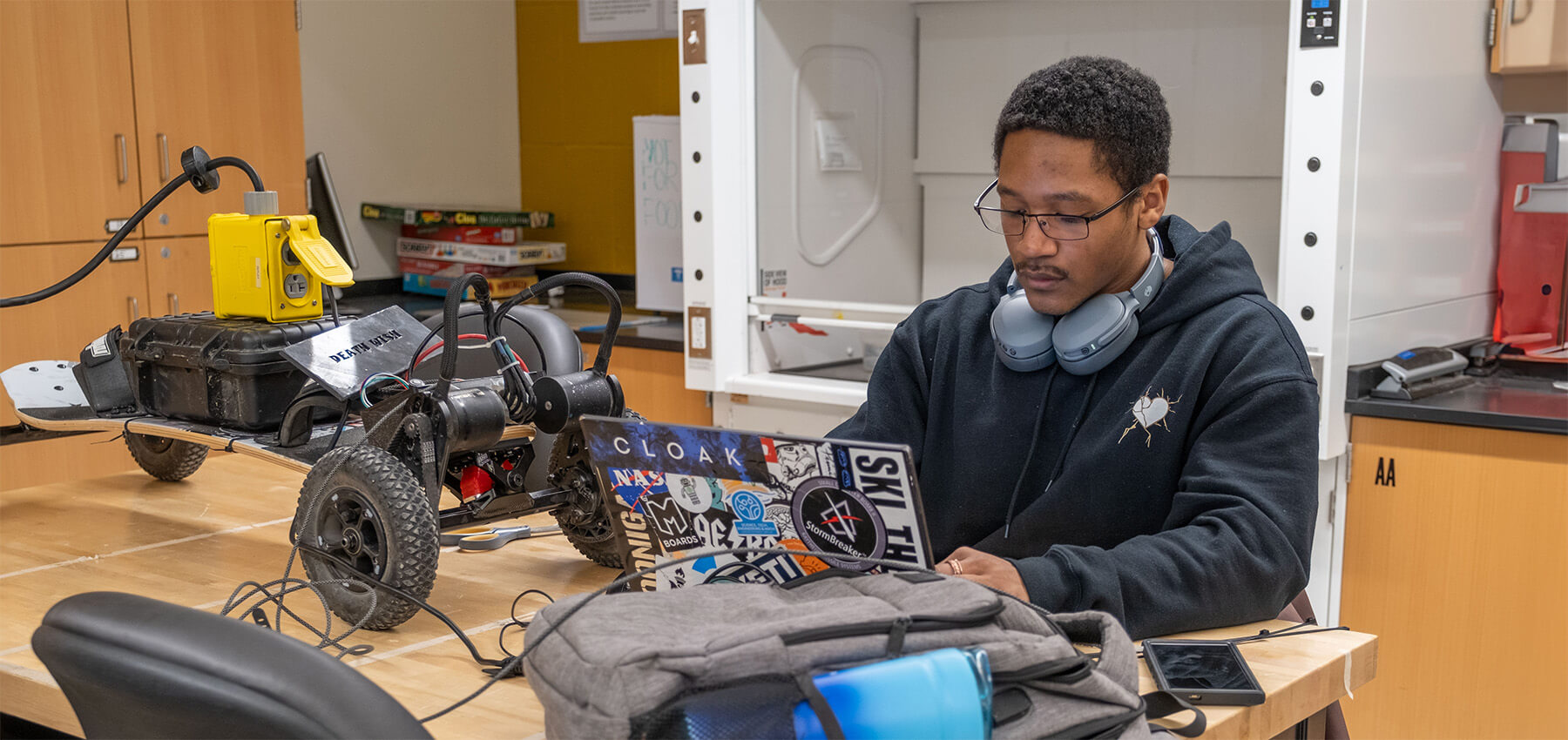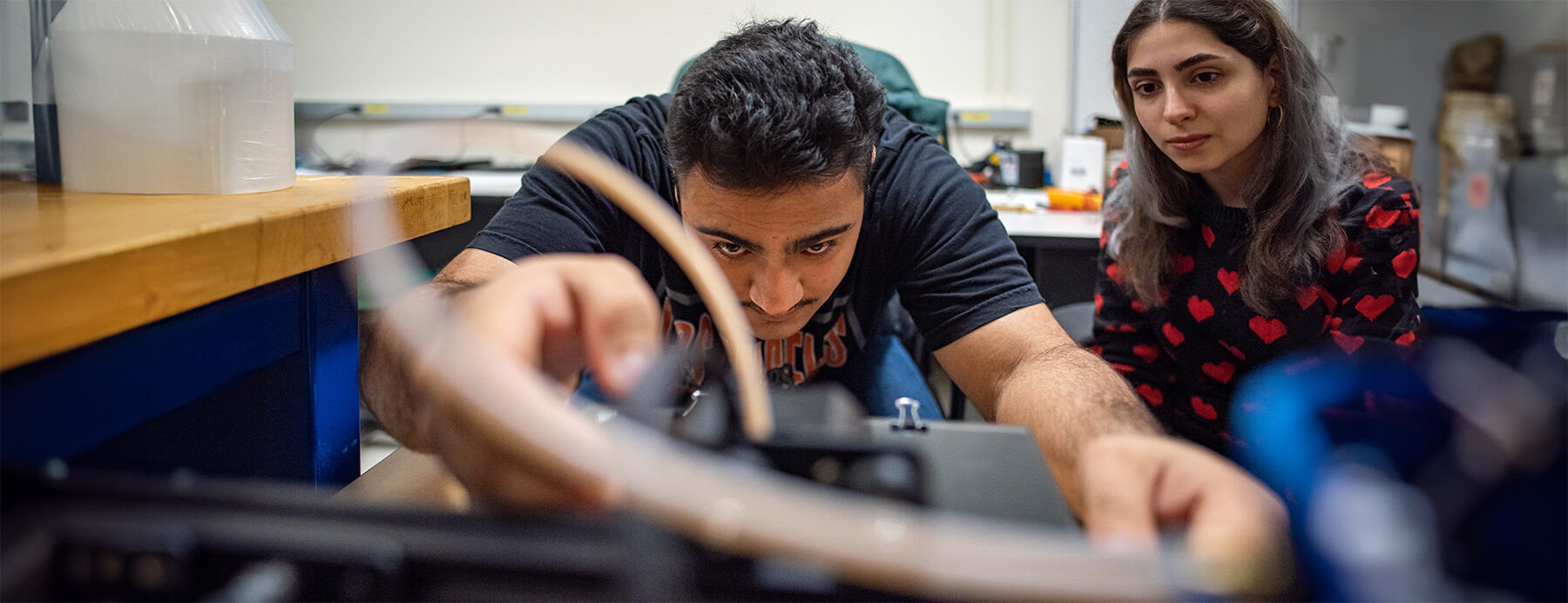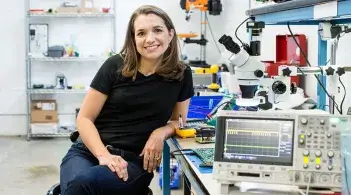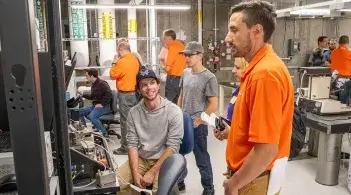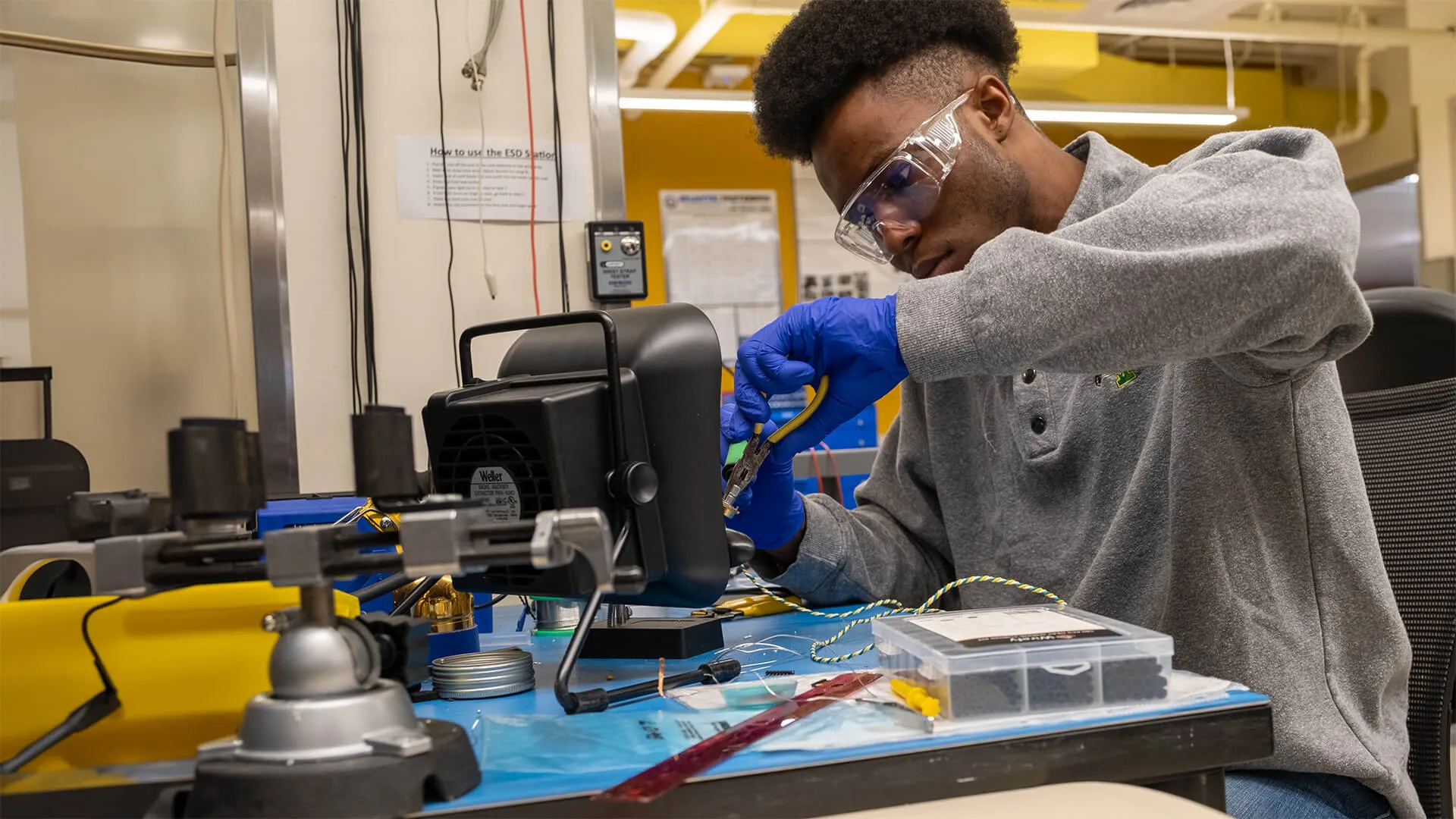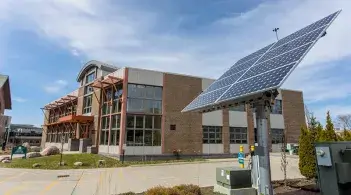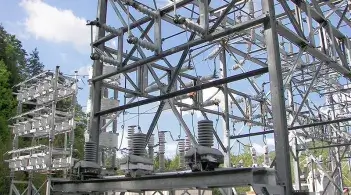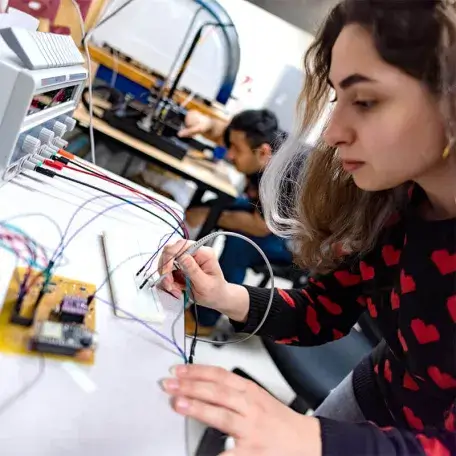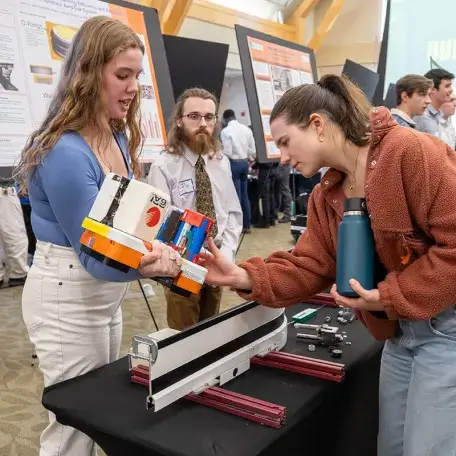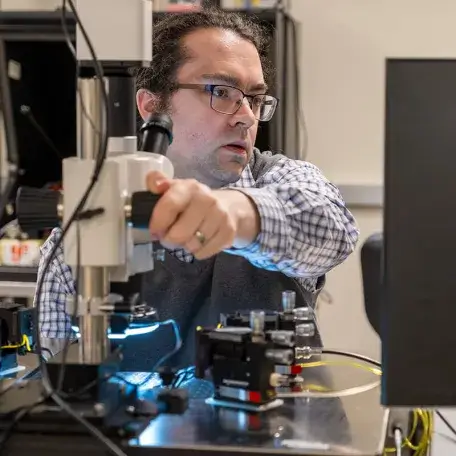Electrical Engineering Graduate Program —M.S. and Ph.D.
When you earn your master’s or doctoral degree in Electrical Engineering from UVM, you’ll be in demand and at the forefront of addressing global challenges in the rapidly growing field of power and energy systems.
You can also specialize in signal processing, communications, and control systems or wireless communications materials and electronic circuit/system design and testing. It’s also possible to earn M.S. and Ph.D. degrees in materials science and a Ph.D. in bioengineering through collaborations with other UVM programs.
Elevate your career and contributions to a better future—join us.
Graduate Programs in Electrical Engineering
What Sets UVM Apart?
Graduate Program Details
Career Outlook
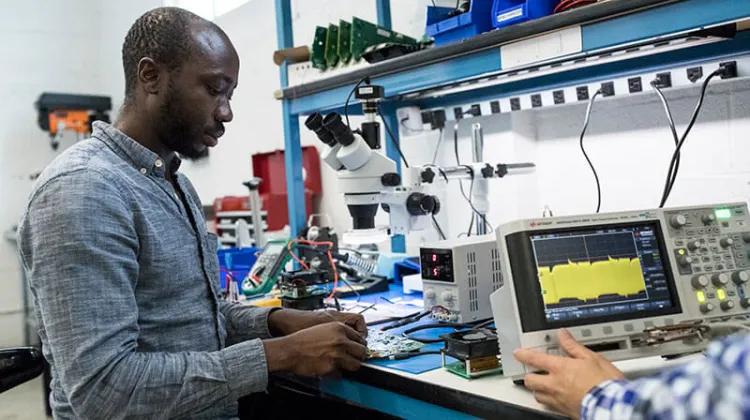
According to the United States Bureau of Labor Statistics, employment of electrical engineers is projected to grow over the next two decades, with current median pay of $101,780, and those on the high end of the pay scale earning more than $162,930.
A graduate engineering degree will allow you to command a more competitive salary when applying to upper-management roles and increase your earning potential over the span of your career.
Research Opportunities
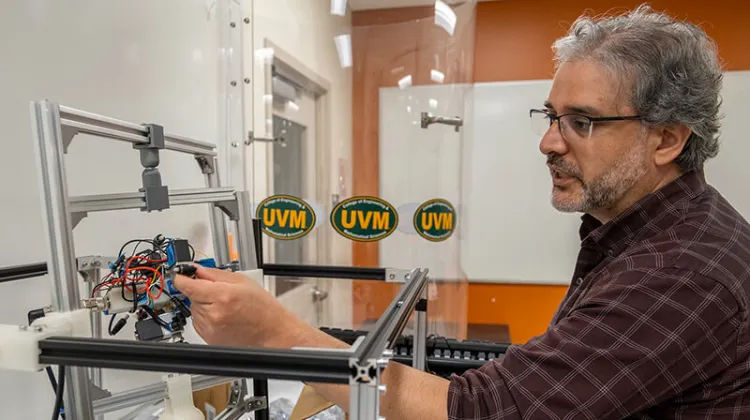
Graduate students contribute to interdisciplinary research within a broad range of applications. Areas of research include power/energy systems, wireless communications, electromagnetics, signal processing, materials and devices, microelectronics, and control systems. Graduate research assistantships, as well as teaching assistantships and other funding opportunities, are available. We are always looking for highly motivated, creative graduate students for fully-funded Ph.D. openings. Individuals with an M.S. degree are preferred.
Our faculty are world-experts in their respective fields which translates into top training opportunities for our students—and professional connections.
Some Research Highlights
The new Center for Resilient Energy & Autonomous Technologies in Engineering (CREATE) is dedicated to improving our fundamental understanding of power and energy systems. Ensuring these systems can adapt to ever-changing market and grid conditions, in order to pave the way for large-scale renewable energy integration — crucial for combating climate change.
The Autonomous and Intelligent systems Research Laboratory (AIRLab) explores the development and deployment of autonomy technologies and is at the crossroads of the fields of systems and control engineering, signal processing, and estimation.
We'll Help You Reach Your Goals
We're here to support you during the application process, help you customize your program, and offer resources that support your success throughout your graduate studies and beyond. Contact us today with any questions.
How To Apply
M.S. Program Admission Requirements:
- Admission to the M.S. program requires an accredited bachelor’s or B.S. degree in engineering, physics, mathematics, computer science, or other appropriate field.
- An undergraduate grade point average above 3.0 (based on a 4.0 scale), strong grades in EE course (B average or better), and strong recommendation letters
- In borderline cases, additional information (such as a phone interview) may be used to evaluate candidates.
M.S. Candidacy Requirements
- Requires either a bachelors’ degree in electrical engineering from an accredited institution.
- or demonstrated mastery of core electrical engineering material, and completion of the M.S. Comprehensive Exam requirements.
Ph.D. Program Admission Requirements
- M.S. degree in Electrical Engineering or its equivalent.
- A graduate student who meets the requirements for candidacy for the M.S. degree in Electrical Engineering and has completed twenty-four (24) credit hours of appropriate graduate course work with a B average (3.0 on a 4.0 scale) or better qualifies to apply to the Ph.D. program.
- An applicant to the Ph.D. program may be admitted provisionally based on a B average or better in twenty-four (24) hours of appropriate graduate coursework toward the M.S. in Electrical Engineering.
Ph.D. Candidacy Requirements
- Completed Ph.D. coursework requirements.
- Completed Ph.D. Comprehensive Examination
- Demonstrated mastery of core electrical engineering material
- Successful defense of dissertation proposal.
Curriculum Overview
Master's Degree Overview:
A minimum of:
- 30 credit hours at the 5000 level or higher
- Completion of a comprehensive examination
NOTE: Master's students may choose a thesis, project, or coursework option.
Doctoral Degree Overview
A minimum of:
- Completed M.S. degree in Electrical Engineering or equivalent, or meet qualifications for the direct-to-Ph.D. route.
- Once admitted, Ph.D. students must successfully meet each of the following requirements:
- Coursework
- Comprehensive exam
- Dissertation proposal
- Dissertation defense
- Final dissertation submission to the Graduate College
Funding Options
This is an exceptional time to pursue a graduate degree at UVM, as research funding has increased fourfold during the past three years. Most Ph.D. students and thesis-based master’s students are funded as graduate research assistants (GRA) or graduate teaching assistants (GTA). These positions come with both a stipend and tuition support.
Gund Barrett Ph.D. Assistantships
The Gund Institute for Environment and UVM’s College of Engineering and Mathematical Sciences (CEMS) seek outstanding Ph.D. students to create real-world solutions to global challenges. These new Gund Barrett Ph.D. Assistantships, supported by the Richard Barrett Foundation, will enable Ph.D. students to collaborate across disciplines on urgent issues at the intersection of engineering and the environment. An interdisciplinary Ph.D. experience. Students will receive up to four years of funding, including an annual $35,000 stipend, tuition, and UVM’s student health insurance. They can also access additional funds for conferences and research costs. Primary advisors must be a Gund Fellow from UVM Engineering (Biomedical, Civil, Electrical, Environmental or Mechanical). Students must pursue a Ph.D. degree in CEMS and mentor undergraduate Barrett Scholars.
EE Graduate Student Handbook
View the Graduate Student Handbook for Electrical Engineering (PDF).
Where our Alumni Work
Our graduates find employment in industries such as aerospace, auto, energy, and power generation, defense, manufacturing, and telecommunications. With the support of the CEMS Career Readiness Program CEMS graduate students have landed jobs with leading tech companies in the state, across the country, and around the globe.
Some of our graduate employers:
“We often hear from collaborators around the U.S. that everyone’s eyes are on Vermont because energy–both technology and policy–and engineering are at the cutting edge in Vermont.”
–Dr. Mads Almassalkhi, UVM Associate Professor
“I worked with some of the most talented people in my field and experienced topnotch research being conducted.”
–Nawaf Nazir, CEMS graduate student, of his internship at the National Renewable Energy Laboratory
